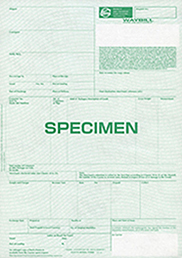JIFFA Waybill

The first advantage of the waybill is that it has the force of a paramount clause as it incorporates the Uniform Rules for Sea Waybills of the Comité Maritime International (CMI).
Similar to the B/L, the waybill is a receipt of cargoes that serves as evidence for the transport agreement. With the waybill, cargoes can be picked up upon their arrival at the destination as long as the consignee is verified.
Under the Uniform Customs and Practice for Documentary Credits (UCP600) enacted by the International Chamber of Commerce (ICC), the waybill has been created as a "non-negotiable sea waybill" and today, it has come to be widely used in place of the B/L in regular transactions between highly credible customers and group companies.
The JIFFA Terms and Conditions of Non-negotiable Waybill (1994) is the short form version and it states that its contents incorporate the JIFFA Terms and Conditions of Multimodal Transport Bill of Lading (1993). Hence, given the danger of members not being recognized as carriers by merchants, especially consignees, that are unable to refer to the JIFFA Terms and Conditions of Multimodal Transport Bill of Lading (1993) even when they assert the exemptions and limits of liability under the Terms and Conditions, JIFFA switched to the long form version of the JIFFA Terms and Conditions of Non-negotiable Waybill (2013) in an effort to reduce the probability of member carriers getting involved in troubles with merchants, as was similarly done with the JIFFA Terms and Conditions of Multimodal Transport Bill of Lading (2013).
JIFFA completely revamped the JIFFA Terms and Conditions of Non-negotiable Waybill (1994), giving birth to the JIFFA Terms and Conditions of Non-negotiable Waybill (2013) on January 1, 2014.
In conjunction with this, the new JIFFA Waybill that promotes the JIFFA Terms and Conditions of Non-negotiable Waybill (2013) has been created.








